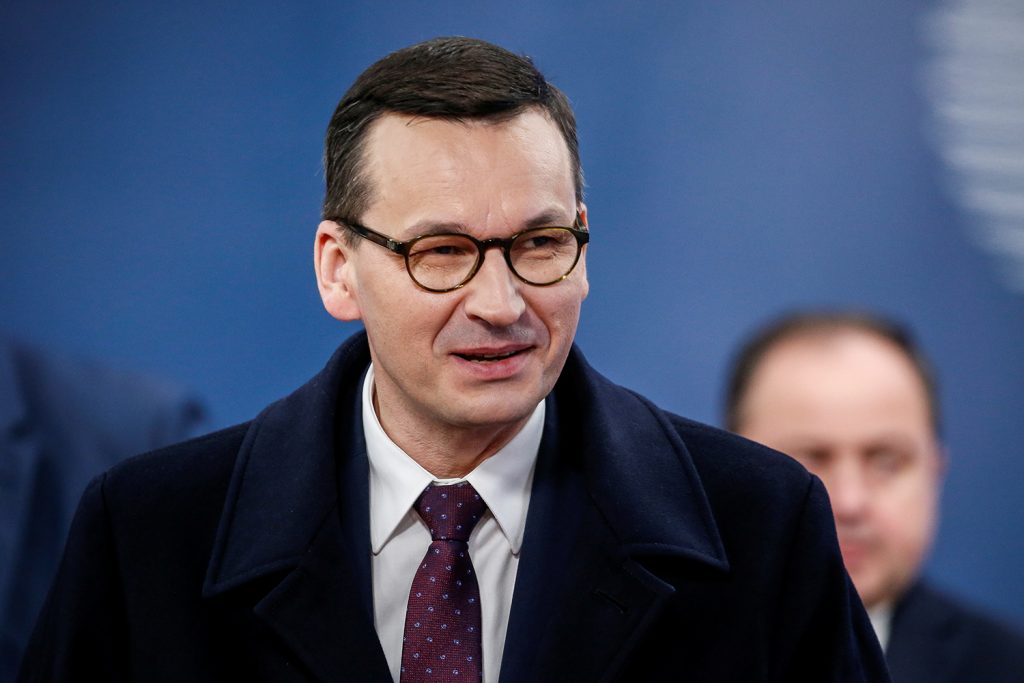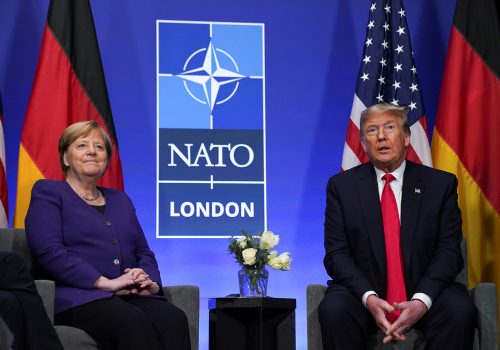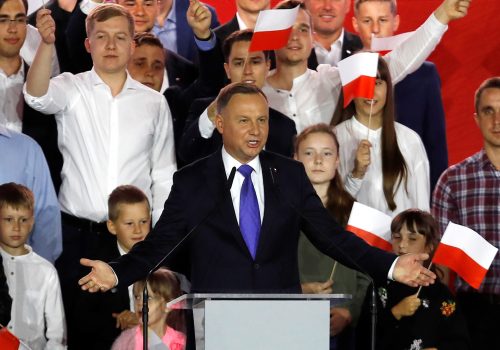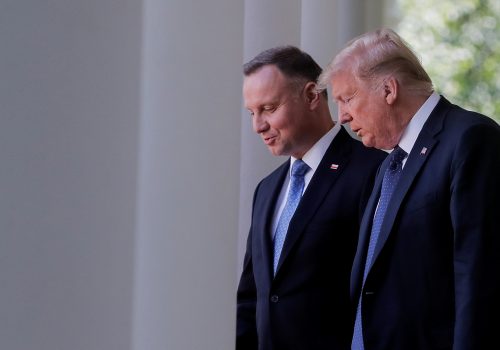As the transatlantic community attempts to control the fallout from the controversial Trump administration decision to pull nearly 12,000 US troops out of Germany, Polish Prime Minister Mateusz Morawiecki called for NATO allies to seek “mutual agreement” on defense issues to preserve alliance unity. Speaking at an Atlantic Council Front Page event, Morawiecki argued that “the NATO alliance is so important for the world to keep peace,” that allies must continue to work toward “consensus” in their actions.
The Polish prime minister extended his call for transatlantic unity on China, where US and European officials have sometimes been at odds over the threat of Chinese investments and 5G technology. Morawiecki said that because Poland is “a very pro-European nation…and at the very same time very much pro-American,” Warsaw can help bridge divides by “translating European fears and expectations and observations into American language and vice versa. We are explaining American fears and observations to our partners in the European Council.”
Here’s a quick spin through Morawiecki’s comments on the impending US troop shifts, Poland’s latest election results, the coronavirus recovery, and more:
Poland ready for US troop deployments:
- Washington’s decision to make: Although Morawiecki called for transatlantic “consensus,” he conceded that it “is a sole prerogative of the US to decide about how many troops they want and where.” He also clarified that “the US, Poland, and German [have talked] to each other and we know that the decision has been taken.”
- Poland prepping for US troops: US President Donald Trump and other administration officials have suggested that some of the troops taken out of Germany could be moved to Poland, pending the competition of a defense cooperation agreement (DCA). Morawiecki reported that there have been “very intense negotiations around this DCA” in previous weeks, and US Ambassador Georgette Mosbacher tweeted on July 31 that the deal had been finalized. The Polish prime minister said that his government is already “preparing our places in Poland to accommodate new American soldiers and to make them feel as good as possible.”
- US-Poland relations “never been better”: The new defense agreement will add to a US-Polish relationship that Morawiecki described as having “never been better.” He highlighted recent deals with Alphabet and Microsoft to increase investment in cloud technology in Poland and explained that “hundreds of American entrepreneurs [are] coming to Poland [and] also treating Poland as [a] gate[way] to the European Union, which works very well.”
Duda re-election brings “stability”
- Duda victory brings “democratic mandate”: Morawiecki spoke just weeks after Polish President Andrej Duda won re-election in very close second round contest. Despite the close contest, Morawiecki noted that the incumbent got the highest number of votes of any candidate in the last thirty years, meaning he has a significant “democratic mandate” and gives Morawiecki’s government “a good starting point for another wave of reforms.”
- Stability for the short term: The prime minister argued that Duda’s re-election will give Poland “political stability for next three and a half years at least, which is important from the point of view of foreign direct investments and new investor investment decisions.”
- What’s next for the government: He said Duda’s priorities for his next term include investment spending, adoption of new technologies such as 5G and artificial intelligence, the strengthening of NATO forces in Poland through the US DCA and the Enhanced Forward Presence, and continued efforts to assist diplomacy in the Middle East.
- Don’t mistake rhetoric for policy: Addressing concerns that the election campaign was filled with divisive rhetoric which could leave Polish society divided after a close election, Morawiecki argued that his and Duda’s Law and Justice Party “is really a big tent party. We have different voices, different wings, and [have] people who are more on the left and more on the right.” Morawiecki cautioned observers not to mistake “sharp rhetoric of some of the members of our big tent party with actual policy.”
- criticism from the United States and other partners. “When I ask German Chancellor [Angela] Merkel or [French] President [Emmanuel] Macron if they [would be] happy if in their countries most of media were in the hands of foreign owned countries, their reply is [obviously no],” he said.
Poland well situated for coronavirus recovery
- Europe’s “historic deal”: The Polish prime minister hailed the successful passage of a coronavirus recovery package and new Multiannual Financial Framework by EU leaders on July 21 as “really historic” and a “very much needed and expected response to an investment gap which is now destroying the European economy [amid] the pandemic.”
- But more needs to be done: Morawiecki cautioned, however, that the packages pale in comparison to the stimulus passed by the United States, and “the response needs to be even bigger than this.” He said his government has prepared additional investment packages and local government aid to help limit the damage.
- Poland sees V-Shaped recovery path: The prime minister noted that Poland has faired better than other EU countries, as unemployment has been “one of the lowest in Europe.” He said he currently “sees quite a V-shaped recovery for Poland and other Central European countries” coming shortly, but added that Western European partners in Spain, Italy, and France “are in a much more difficult position.”
Managing the threat from Beijing
- Transatlantic ties come first: As the Trump administration ramps up its campaign to curb Chinese influence globally, Morawiecki explained that Poland would like “to cooperate with any partner in the world” including China, but “we have to base our cooperation on trusted and mutual partnership with our transatlantic allies.”
- Seeking a rebalance with Beijing: Poland is specifically attempting to make its relationship with China “more balanced” as Morawiecki noted that China’s export to import ratio with Poland is twelve to one.
- Europe must heed US warnings: Morawiecki said it was important for European allies to listen to US concerns about China’s intellectual property theft, saying “one should not put his head in the sand and not realize that China and some other partners are growing with our Western…technology, and that some of this technology was [gained] in a not appropriate way.”
- Warsaw can bridge the gap: The Polish prime minister suggested that Warsaw could help serve as a bridge between Europe and the United States on these issues, “translating European fears and expectations and observations into American language and vice versa.” He stressed the importance of finding “positive language” through which both sides of the Atlantic can better discuss their views on “5G, defense cooperation, geopolitical cooperation, and new investments all around the globe.”
David A. Wemer is associate director, editorial at the Atlantic Council. Follow him on Twitter @DavidAWemer.
Further reading:
Image: Poland's Prime Minister Mateusz Morawiecki arrives for the a special European council on budget in Brussels, Belgium February 20, 2020. Julien Warnand/Pool via REUTERS



